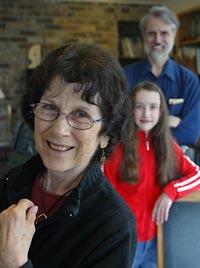Lessons on dealing with critical illness

Last summer, my life spun out of control, and kept spinning for some months. If you read The Seattle Times' Personal Technology section, you may have noticed my "Getting Started" column disappeared last August. I am now getting re-started, and my column will soon return. In the meantime, I'll share my story, and some of the lessons I've learned that may be helpful to others who become gravely ill — and their families.
It began last summer, when I caught cold after cold, and then one night spiked a fever. My husband called the advice nurse at Group Health, who advised him to bring me to the hospital. He did, and it didn't take long to diagnose a severe bacterial meningitis infection.
I fell into a coma. Some of the doctors said I would probably die. But I couldn't hear them. When I woke up eight days later, I was completely deaf. I couldn't see out of my left eye, and I could barely sit up, never mind walk. Still, at 77 pounds, I was alive.
Powerful medicine
Crises happen; we all know that, but they always happen to other people until one day, in an instant, your life is changed forever. It begins with an accident or a diagnosis, and continues with endless medical exams, tests, needles, pills and other treatments.
Often such a crisis impacts the whole family, especially if it brings on major medical bills, critical decisions to be made about treatment and care and — if there are young children — decisions about their daily care and emotional needs.
This isn't the first medical crisis I've faced, so the effects weren't a total surprise. Years ago, my body started accumulating black-and-blue marks like mosquito bites, and my gums started bleeding at any excuse. One doctor's visit diagnosed aplastic anemia, which meant my body had stopped producing blood, and in the 1970s, that meant almost certain death.
Still, I recovered from that illness after submitting to a splenectomy (removal of the spleen) and massive doses of steroids. But the real cure, in my mind, was the daily dose of ice cream delivered by my male friend (now my husband).
This time, it's meningitis that has been beaten, partially by modern medicine, but also by daily doses of Starbucks lattes, delivered every morning by my husband.
One of our friends, who happens to be a doctor, told my husband early on that the most important treatment is consistent and loving care from family members. Surprising words from a doctor, and yet they've proven true for me.
So, count this as Lesson 1 in my personal "how-to" for surviving a serious illness and managing the recovery: Small, frequent expressions of love are powerful medicine.
Prepare for a crisis
A few weeks after I woke from the coma, I was transferred to the transitional care unit at Foss Home in North Seattle, where I remained for the next three months — enough time to regain my normal weight (90 pounds) and kill off the microscopic villains messing up my left eye. The goal was to get me disease-free and able to face surgery that would implant part of a hearing system into my head.
Week after week, I faced test after test — including a TV view of my heart beating and my stomach churning — plus the usual blood tests, pills, IV medications, physical therapy and frequent evaluations of my hearing (nothing there), eyesight (blind in one eye), motor ability (significantly deteriorated) and so on.
Luckily, it was a few months before they got to IQ testing. Once, early in the illness, I asked my husband where the caffeinated and decaffeinated bathrooms were. Another time, I thought I'd been abducted during the night, and once I told a woman sitting next to me that I'd left my pocketbook in her car.
When I finally did have that four-hour IQ test in February, I was over the crazies, and results indicated my brain was functioning again. Whew!
It was awful to be away from home for an extended period. Plus, my illness and prolonged absence from home created a huge burden for my family, especially my husband, who had to take over all my family chores and child-care responsibilities in addition to his own.
He took time off work to be with me, and to drive me to countless medical appointments. In doctors' offices, he took notes, which we later reviewed and used to plan our next steps. When I finally came home, he continued administering the IV medications and took me to many more appointments.
Which brings me to Lesson 2: Before a major illness strikes any family member, think through how you will handle it. Talk to your spouse and the others you live with about critical issues such as these: Who will be the main contact person for doctors? How will medical bills be paid? Who will care for children or other dependants?
My husband and I never had these preliminary conversations. I was lucky that he was able to oversee my care and take care of our 12-year-old daughter. But what if my circumstances had been different?
Focus on the future
It was November when I finally came home. Then, for a couple of months, I continued working with therapists from Rehab Without Walls, an independent organization that provides therapists to work with people in their homes. The physical, occupational and "speech" (actually cognitive) therapists I worked with came once or twice a week to teach and review daily physical exercises, thinking skills and ordinary household chores. They were very helpful, and good company as well,
Six weeks of intravenous antibiotics did manage to kill the bugs attempting to destroy vision in my left eye, and soon I could see reasonably well again.
By December, I was ready to face surgery. It seems strange, but I'm lucky that I lost all of my hearing instead of just part of it. Zero hearing qualified me to receive a hearing system, called the Cochlear Nucleus Freedom, which includes a surgically implanted microchip and 22 wire electrodes that magnetically connect to an outside (over-the-ear) processor. The outside processor breaks up incoming sounds and transmits them to the inside processor, which then distributes them to the 22 electrodes that go to the auditory nerve and then on to the brain.
Surgery went well, and I've spent the past few months relearning how to hear in various environments, from listening to dinner-table conversations to watching TV and managing crowd noise at karate tournaments. With plenty of practice, I hope to be able to dim background noise, but that seems like a daunting task. Still, I'm determined to become an expert user of this high-tech system, since this is how I'll hear for the rest of my life.
I had hoped the surgery would help improve my balance and enable me to walk more steadily (instead of like a drunk lady). But, of course, it doesn't provide me with a new inner ear — I have to use my eyes and body parts to keep me steady, and clearly, I need a lot more practice walking.
And this brings me to Lesson 3: Accept the illness, plan how to deal with it and think positively about the future. Again, I'm lucky. In addition to my supportive family, the doctors, physical therapists and audiologist who've worked with me are extremely competent and have been helpful in my follow-up care.
I'm lucky to have friends in the medical profession who have explained issues and treatments beyond a layperson's comprehension, and who have provided excellent advice.
I'm also lucky to have friends who offered to help, and then drove my daughter to karate classes and cared for her when my husband and I where busy with doctors.
I'm lucky that even though meningitis typically attacks the brain, mine managed a magnificent comeback. I'm lucky that my health insurance covers the huge cost of surgery and followup care, and that this high-tech hearing system works far better than standard hearing aids that merely amplify any sounds the wearer can hear.
Accepting disability is not easy, and I'm still not good at it. I hate wobbling when I walk, for example, so I try to focus on how great it is that I can walk at all now — and sometimes without a cane.
Color me lucky to be alive. It's been a long journey — from sinking into a coma to sitting at my desk to write this. I've learned a lot about myself and other people with disabilities. I'm thankful the problems I've endured are mostly curable and I can be (almost) normal again, if I'm patient and work hard.
I am lucky.
Write Linda Knapp at lknapp@seattletimes.com; to read her Getting Started columns, go to: www.seattletimes.com/gettingstarted. Her column will return to The Seattle Times' Personal Technology section on Saturday.

Managing an illness![]()
![]()
A successful doctor-patient relationship is a key part of recovering from an illness or accident. The doctor provides the medical knowledge, but the patient's personal support system can facilitate the treatment with everything from record-keeping to child care. Here are some tips for helping to manage your own or another person's illness:
Keep in one place all medical records and other related communication, as well as notes taken at appointments, prescriptions, treatments, plus the names and addresses (even e-mail addresses if they're available) of all the medical experts on your team. You'll refer to this information when you communicate with them and when you want to review your progress and take further steps.
Seek further medical information and advice after leaving the doctor's office when you need it. Doctors sometimes give abbreviated explanations and advice, leaving patients to accept minimum information or find more for themselves. The Internet is one valuable resource, but be sure to go to medical sites managed by legitimate medical experts. MedlinePlus.gov, sponsored by the National Library of Medicine (one of the National Institutes of Health), is always good and gives an abundance of links to information. The Mayo Clinic site also is quite good and includes sections including overview, symptoms, causes, etc.: www.mayoclinic.com/health/meningitis/DS00118
Keep in mind that medical care is fragmented, and patients with multiple issues often need to see several doctors. Typically one doctor has responsibility for coordinating care, but the patient still needs to oversee the process and make sure treatments and check-ups happen as planned.
Pay attention to the overall plan, and don't be shy about contacting doctors to keep treatment moving at a reasonable pace. Doctors, like most busy people, sometimes forget things.
Before going to a doctor's appointment, plan what you want to ask, and prepare a list of questions. Bring a pen or pencil to write down the answers. The written list helps keep the appointment focused and keeps you from forgetting what you want to ask.
Ask for help from friends and relatives when you need it. Before asking, however, try to get a sense of who is actually willing to help and also has the time. People may surprise you. Often they want to help, but don't know how and don't want to get in the way. When you ask for assistance, they may well be relieved — and willing.
Linda Knapp
Learn more about bacterial meningitis: www.cdc.gov/ncidod/dbmd/diseaseinfo/meningococcal_g.htm